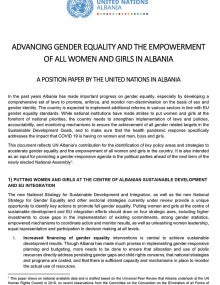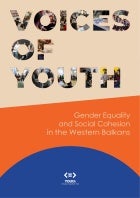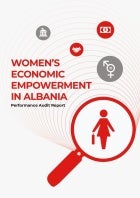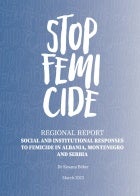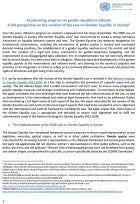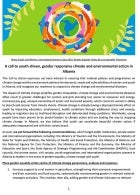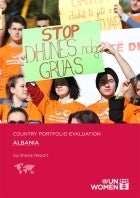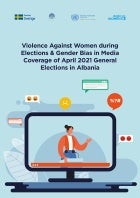1 - 20 of 22 Results
Pagination
Date:
Since the launch of UN Women’s strategic note for Albania (2022–2026), UN Women Albania has made significant strides in enhancing its reach and impact across the nation.
Date:
This regional research, implemented by UN Women and co-designed, conducted and developed by five young researchers from Albania, Bosnia and Herzegovina, Kosovo1 , North Macedonia, and Serbia aims to explore the linkages between youth development, gender equality, and social cohesion challenges in the region.
Date:
This Guidance Notes series provides succinct information on the key gender issues in selected policy areas, and to show how gender mainstreaming can be done in practical terms. This set of tools is made available through the EU’s and UN Women’s technical support to the Government of Albania in the context of accelerating the process of EU integration.
Date:
The Supreme State Audit Institution in Albania has conducted a performance audit on the “Economic Empowerment of Women”, in the framework of the “Transformative Financing for Gender Equality Towards More Transparent, Inclusive and Accountable Governance in the Western Balkans” project, financed by the Government of Sweden – SIDA, with the technical support of UN Women Albania.
Date:
The regional report “Social and institutional responses to femicide in Albania, Montenegro and Serbia” was developed by FemPlatz with the technical support of UN Women in the framework of the regional programme on ending violence against women in the Western Balkans and Türkiye “Implementing Norms, Changing Minds,” funded by the European Union. The report – the result of three years’ work to develop a framework for understanding the characteristics, patterns, and causes of femicide – is the first interdisciplinary research on the societal and institutional response to femicide in Albania, Montenegro and Serbia.
Date:
A joint advocacy piece on the Gender Equality Law from the United Nations in Albania.
Date:
This manifesto includes a series of concrete recommendations to promote gender-responsive solutions to climate change that are youth-led, including innovative actions to push the climate and environmental justice agenda in the country.
Date:
This report presents the main findings, lessons learned, conclusions and recommendations of the Country Portfolio Evaluation of the UN Women Albania Country Office Strategic Note 2017– 2021, conducted between January and July 2021.
Date:
The “I Have a Dream” photography project, by UN Women Albania and Jutta Benzenberg, illustrates the dreams of Albanian young and adolescent women from remote areas of the country. This project is a call to society for equal rights and opportunities for defying gender stereotypes.
Date:
A media monitoring study was conducted prior, during and after the general elections in Albania in 2021.
Date:
This comparative summary presents key data on public perceptions and attitudes towards violence against women and girls and gender stereotypes in Albania based on the findings of baseline, mid-term and end-line surveys. The summary was developed by the Observatory for Children and Youths Rights in Albania, within the UN Women regional programme on ending violence against women in the Western Balkans and Turkey “Implementing Norms, Changing Minds,” funded by the European Union.
Date:
“Women and Men in Albania” is published yearly by the Albanian Institute of Statistics (INSTAT) and displays data disaggregated by gender, aiming at the collection, analysis, and presentation of statistics by gender, and mirroring the social issues encountered on the cross-cutting policies monitoring, in the framework of achieving gender equality.
Date:
This publication has been produced by UN Women Albania to assess the impact of COVID-19 pandemic on main challenges faced by women and men, and how the changing situation is affecting the socio-economic situation and livelihood of women and men.
Date:
The report offers a concise, data-driven look at the implementation of the Beijing Platform for Action and issues a clarion call for stepping up progress to realize the promises of Beijing. It covers countries from the United Nations Economic Commission for Europe region and it is based on available data and information in the regional and global databases.
Date:
“Women and Men in Albania” is an annual publication, which presents data on different areas of life divided by gender, in order to reflect the problems of society in terms of achieving gender equality.
Date:
In response to the novel coronavirus (COVID-19) pandemic and the relatively limited data available, the UN Women Regional Office for Europe and Central Asia, through the Making Every Woman and Girl Count global programme, developed a rapid survey assessment tool to assess the gendered impacts of COVID-19 on the main challenges faced by on women and men lives and livelihoods.
Date:
In May 2020, UN Women initiated online consultations with gender equality mechanisms from 14 countries in the Western Balkans and Turkey, Eastern Partnership and Central Asia sub-regions to discuss challenges and priorities for the gender dimensions of the short- and long-term COVID-19 response.
Date:
This report is a compilation of the perspectives of feminist and civil society organisations from more than 45 countries in the region that participated in the preparations and during the civil society forum itself, on the 28th of October 2019 in Geneva.
Date:
The "2018 Public Perceptions of Gender Equality and Violence against Women" Infosheets provide insight of current and dominant attitudes and perceptions (and the factors that influence them) toward gender equality and violence against women at community level in the Western Balkans and Turkey.
Date:
Women and Men in Albania” is a yearly publication by the Institute of Statistics in Albania that brings to the public comprehensive information on gender statistics in the country. 2018 edition contains for the first time data about causes of death and about internal migration of women and men.
